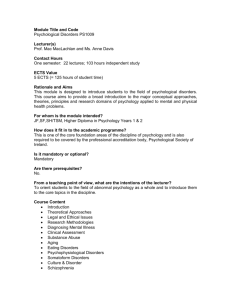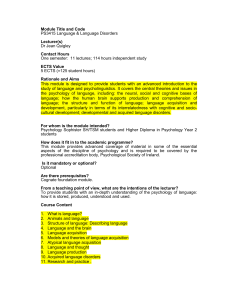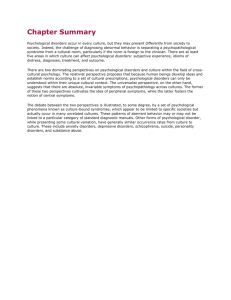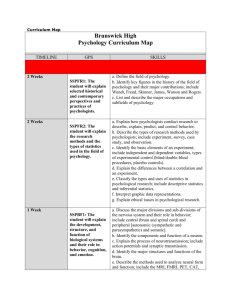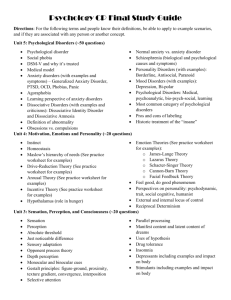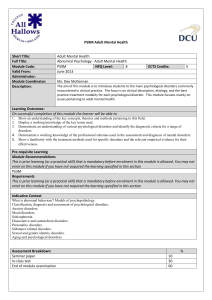PS1009 Psychological Disorder Module
advertisement
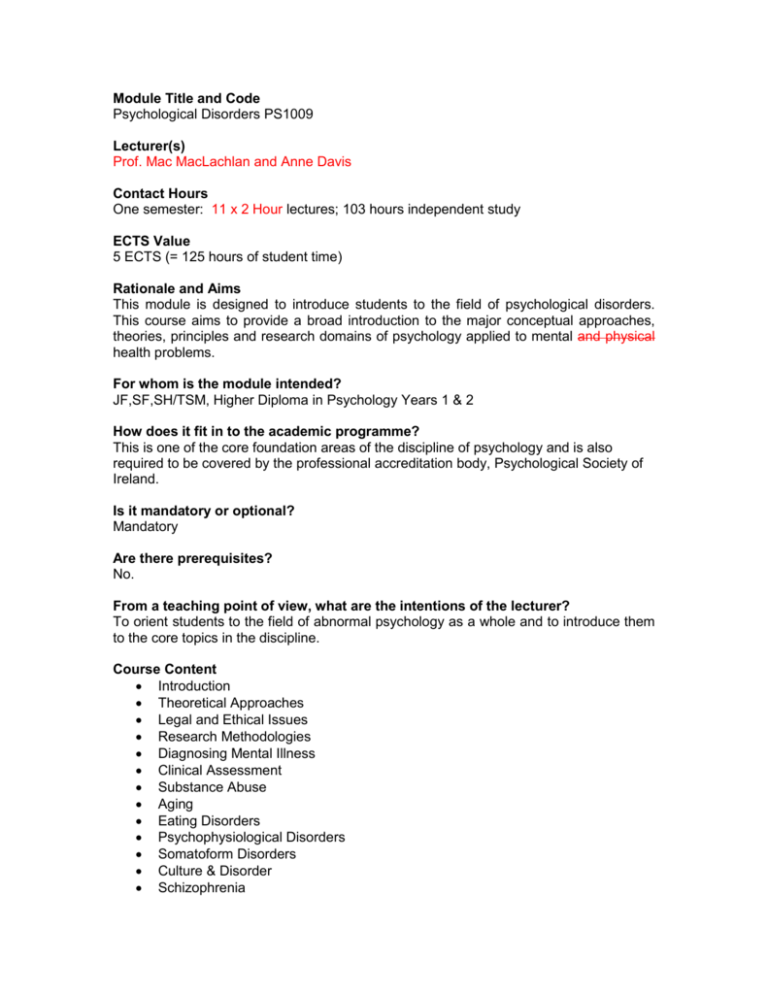
Module Title and Code Psychological Disorders PS1009 Lecturer(s) Prof. Mac MacLachlan and Anne Davis Contact Hours One semester: 11 x 2 Hour lectures; 103 hours independent study ECTS Value 5 ECTS (= 125 hours of student time) Rationale and Aims This module is designed to introduce students to the field of psychological disorders. This course aims to provide a broad introduction to the major conceptual approaches, theories, principles and research domains of psychology applied to mental and physical health problems. For whom is the module intended? JF,SF,SH/TSM, Higher Diploma in Psychology Years 1 & 2 How does it fit in to the academic programme? This is one of the core foundation areas of the discipline of psychology and is also required to be covered by the professional accreditation body, Psychological Society of Ireland. Is it mandatory or optional? Mandatory Are there prerequisites? No. From a teaching point of view, what are the intentions of the lecturer? To orient students to the field of abnormal psychology as a whole and to introduce them to the core topics in the discipline. Course Content Introduction Theoretical Approaches Legal and Ethical Issues Research Methodologies Diagnosing Mental Illness Clinical Assessment Substance Abuse Aging Eating Disorders Psychophysiological Disorders Somatoform Disorders Culture & Disorder Schizophrenia Childhood Disorders Depression Anxiety Personality Disorders Sexual and Gender Identity Disorders - added Evaluating Psychotherapy Indicative Resources Recommended text: Kring, A., Davison, G. C., Neale, J. M. & Johnson, S. (2010) Abnormal Psychology, 11th Edition. International Student Version. Asia: Wiley & Sons. Web Resources: http://www.wiley.com/college/davison (contains links to sites related to abnomal psychology) Other readings are given as the module progresses and supporting additional reading resources are made available to students in the School resource room. Learning Outcomes On successful completion of this course, students will be able to: describe and outline major theoretical approaches to psychological disorder [PO2,4]; identify contemporary diagnostic criteria for a range of disorders [PO1,2,3]; critically evaluate the role of social, cultural, and economic influences in defining and diagnosing psychological disorders [PO2,4]; describe the application of research methodologies to studying psychological disorders [PO2]; appreciate the contribution of psychological factors in the cause, expression, and treatment of a range of clinical problems [PO2]; critically evaluate the efficacy of psychological intervention [PO2,4]. Methods of Teaching and Student Learning The format of lectures is conventional but students are encouraged to ask questions and to engage the lecturer in discussion where practicable. Inclusive curriculum: Each lecture and any supporting and accompanying documentation is posted on our school website to facilitate independent study and selfpaced learning. Methods of Assessment There is a Multiple-Choice Questionnaire examination in the annual session that constitutes 100% of the assessment of this module. The exam is 2hours in duration. Students are given very detailed guidelines in their handbook as to grading criteria for degree classes. Evaluation All modules are evaluated by students by means of CAPSL survey requested by the School and all feedback is noted and incorporated in module design where appropriate for delivery of the module in subsequent years. Feedback is also delivered via student representatives at the School’s once a term staff-student meetings, at School Committee meetings and at the Committee for Undergraduate Teaching & Learning meetings.

